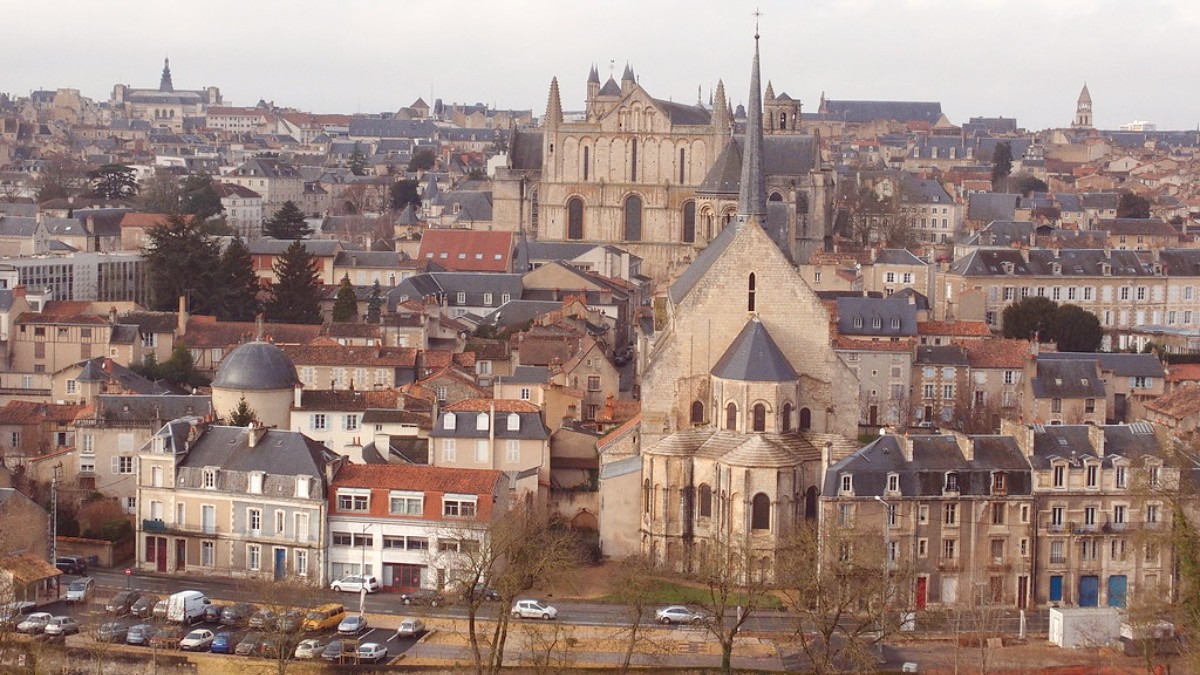
Southwestern France, France
Poitiers, situated in Southwestern France, has distinct seasonal patterns. Each provides an unique atmosphere for travelers.
Spring and early autumn temperatures invite comfortable exploration. Summer brings warmth and longer days, ideal for outdoor activities, though crowds increase. Winter offers a quieter, more local experience, with fewer visitors and lower prices.
The time of year greatly shapes your experience in Poitiers.
For outdoor pursuits like cycling or walking through parks, spring and early autumn present the most comfortable weather. When visiting Futuroscope, the shoulder seasons (late spring or early autumn) avoid the longest queues while still holding favorable weather. Summer evenings work well for Futuroscope's evening show. The historic city center suits exploration at any time of year. Winter offers a quiet, contemplative atmosphere for historical exploration.
July-August
Warmest weather, full Futuroscope schedule.
Largest crowds, higher prices, potential heatwaves.
April-June, Sept-Oct
Pleasant weather, fewer crowds, lower prices, blooming flowers/fall colors.
Variable weather, shorter daylight in late autumn.
November-March
Fewest crowds, lowest prices, quiet local experience.
Cold weather, shorter daylight, some attractions reduced hours.
Poitiers, like much of central and southwestern France, experiences heatwaves during July and August. Temperatures exceed 35°C (95°F). During these periods, staying hydrated, seeking shade, and planning indoor activities during the hottest parts of the day is good practice.
Winter brings periods of freezing temperatures, especially overnight. Dress in warm layers for comfort. Heavy snowfall in Poitiers is rare, but light snow does occur periodically.
Drink plenty of water during warm months.
Good for spring, autumn, and cold winter days.
Use sunscreen and wear a hat in summer.
Consider museums and cafes during heatwaves or cold spells.
Always view the local weather outlook before outings.
Preparation of documents helps ensure smooth entry into France. Here are items to organize for your trip.
These are generally necessary for all travelers upon arrival in France.
Financial stability and health preparation support your visit.
France uses the Euro (€).
Consider a travel-friendly credit card with no foreign transaction fees. This approach provides savings on purchases.
These averages offer a general idea of daily expenses. Actual costs fluctuate based on season, demand, and how far in advance you book.
Budget Traveler (€50 - €80 per day): Stays in hostel dorms or basic budget hotels. Meals include self-catering, street food, and affordable takeaways. Transportation relies on walking and public buses. Activities focus on free attractions like churches and parks.
Mid-Range Traveler (€100 - €180 per day): Accommodations in comfortable 3-star hotels or charming Chambres d'hôtes. Meals mix budget options with casual restaurant dining. Transportation uses public transport, occasional taxis, or bicycle rentals. Activities include museums and a one-day Futuroscope ticket.
Price per night. Hostel dorms start around €25-€40. Budget hotels range from €50-€80. Mid-range hotels are typically €90-€150. Luxury accommodations are €180+.
Hostel dorm bed: €25-€40.
Luxury hotel: €180+ (highest cost).
Bakery items like a croissant or sandwich are €2-€6. A budget meal can be €8-€15. Mid-range restaurant meals (plat du jour) are €18-€30. Fine dining starts at €50+.
"Menu du jour" at lunch offers good value.
Fine dining, excluding drinks, represents a higher cost.
Local bus tickets are around €1.50-€1.70. Taxis for short rides are €10-€20+. TGV train tickets to Paris vary from €30-€80. Museum entrances typically cost €5-€10. Futuroscope 1-day tickets are €40-€55.
Walking and local buses reduce costs.
TGV tickets and Futuroscope visits represent prominent expenses.
| Strategy | Benefit | Details |
|---|---|---|
| Free Attractions | Cultural experience without cost. | Explore historic old town, Cathédrale Saint-Pierre, Église Notre-Dame la Grande, Parc de Blossac. |
| Picnic Lunches | Affordable, delicious meals. | Purchase fresh bread, local cheeses, cured meats, fruits at Les Halles de Poitiers. |
| "Menu du Jour" | Experience local cuisine at a lower price. | Fixed-price lunch menus offer two or three courses for less than dinner options. |
Poitiers presents a generally safe environment for travelers.
Ensure routine vaccinations (MMR, DTP, Varicella, Polio) are current. An annual Flu shot is advisable for travel during flu season. Consult your doctor for personalized recommendations.
During summer, use High-SPF sunscreen, wear a hat, seek shade, and stay hydrated with Plenty of water.
Practice good hand hygiene before eating. Tap water in Poitiers is safe to drink.
France boasts a high-quality healthcare system.
European Health Insurance Card (EHIC) for EU/EEA/Swiss citizens provides access to state-provided healthcare at a reduced cost. For all other travelers, comprehensive Travel insurance is strongly recommended. It covers medical emergencies, hospitalization, and emergency medical evacuation.
Pharmacies (Pharmacie), marked by a green cross, offer advice and over-the-counter medications. The main public hospital is Centre Hospitalier Universitaire (CHU) de Poitiers.
Compare policies from reputable providers like SafetyWing or Insubuy.
Tap water in Poitiers is safe to drink unless a sign says "eau non potable."
Food hygiene standards in France are very high; enjoy street food and market produce with confidence.
Poitiers has a low crime rate. Petty crime, like pickpocketing, can occur in crowded areas. Secure valuables with a Money belt or RFID-blocking wallet. No "no-go" neighborhoods exist, but standard urban precautions apply.
Comprehensive Travel insurance offers peace of mind. Purchase a policy covering medical emergencies, evacuation, trip interruption, lost luggage, and personal liability. Compare policies from reputable providers. Memorize or save emergency numbers before your trip.
112 (all services)
17
15